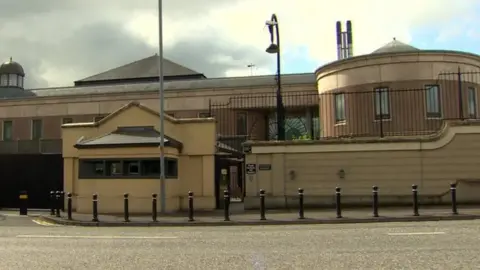Man in court charged with 1970s murder of part-time UDR soldier
 BBC
BBCA 67-year-old man originally from County Armagh has been refused bail after being extradited from the Republic of Ireland and charged with a Troubles-era murder carried out more than 45 years ago.
Joseph James Porter's body was found close to the entrance of his farm at Creggan Road, in Mountnorris, County Armagh, on 24 June 1979.
The part-time Ulster Defence Regiment (UDR) soldier died from gunshot wounds to the head and body.
James Donegan, of Bruce Manor in Arvagh, County Cavan, appeared in the dock at Newry Magistrates' Court on Wednesday afternoon following a lengthy extradition process from the Republic of Ireland.
The court heard that on the night that he was killed, Mr Porter had been in a local bar and was last seen alive driving home around 23:25 BST.
The prosecution lawyer described how neighbours and witnesses heard two loud bangs, "which they recognised as gunshots", around an hour later.
His body was discovered at 09:30 and when police arrived at the scene, they discovered that while there was no evidence of a forced entry, his house had been ransacked with the assumption that his killers were searching for his personal protection pistol and any other weaponry they could find.
His pistol was indeed stolen and a few days later the Provisional IRA claimed responsibility for the murder, outlining that Mr Porter was "interrogated and executed because of his involvement in the British war machine in Northern Ireland".
Police enquiries established that the murder weapon, a Ruger rifle, had been used in subsequent attacks on the security forces.
Extradition
Prosecutors said they can link Mr Donegan, who has lived in the Republic of Ireland since the 1970s, to the murder as a result of drops of blood and fingerprints that had been found.
The court heard that in 2012 the Historical Enquiries Team (HET) produced a fingerprint match and that, in 2017, the Police Service of Northern Ireland (PSNI) asked An Garda Siochana (Irish police) to pursue an inquiry into the murder.
In 2017, prosecutors in the Republic brought no charges on the matter due to insufficient evidence – but, in 2024, the PSNI applied for an extradition warrant.
Mr Donegan fought extradition but when his appeal was dismissed he presented himself for arrest.
He is charged with murdering Mr Porter on a date between 22 June 1979 and 25 June 1979.
He also faces charges relating to the possession of a firearm with intent to endanger life and membership of a proscribed organisation, namely the IRA.
A defence barrister argued that due to a backlog in trials it could be some time before a trial date could be set – meaning that if Mr Donegan was put on remand a trial could be further away than the two-year sentence the offences carry under legislation.
However, District Judge Eamonn King said he was content that Mr Donegan could be considered a flight risk and, as such, bail was refused.
Mr Donegan's defence barrister stated the matter could be revisited in the High Court.
